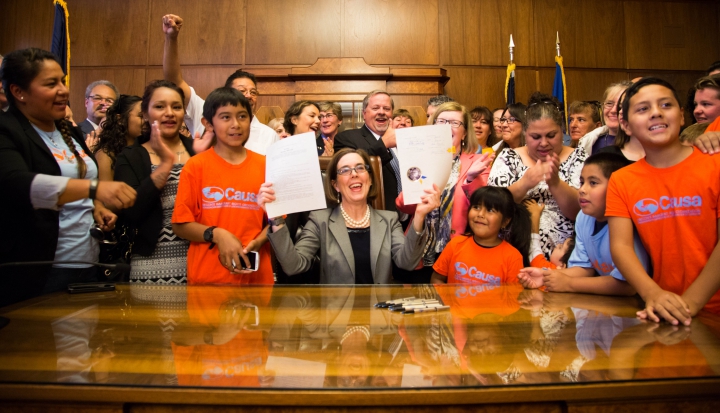Despite working hard, thousands of families are struggling to make ends meet. Last summer more than 20 community groups, labor unions, and social justice organizations came together in Oregon to form Fair Shot for All, a coalition dedicated to economic, racial, and gender justice. We joined forces because we saw the challenges that women, people of color, immigrants, and working families in our state are facing every day. We knew the time had come to strengthen our communities instead of watching income and wealth inequalities continue to grow.
Fair Shot for All launched with a unified vision: to give a voice to those who are too often left out of political and legislative processes, to bring together constituents from an array of social justice movements, and to pass public policies that ensure every Oregonian has a fair shot at economic opportunity, security, and success.
It’s often a challenge for working families to participate in the legislative process, which means their voices aren’t heard by the people they elected to represent them and their needs are often left unmet. The problems that result from this are clear: 400,000 Oregonians are employed in low-wage work; more than 1 million Oregonians rely on food stamps and other assistance to feed and support their families; and 95 percent of income gains go to the wealthiest 1 percent of income earners.
To create an economy that works for all of us, especially those who are struggling the most, we needed to take immediate action—building a collective effort that lifted up a variety of economic justice issues and created a framework that helps us understand their deep-rooted connections.
Our 2015 legislative session was one of the most consequential in recent history for Oregon’s working families. As a result of the Fair Shot for All coalition’s efforts, we expanded access to paid sick time statewide, expanded employment opportunities by removing questions about criminal history from employment applications, made saving for retirement easier by creating a state-run retirement savings program, and banned the use of profiling as a law enforcement tactic.
We came into our legislative session ready to have a public conversation about racial and economic inequality in Oregon, push for real solutions, organize our members, and hold legislators accountable. Thanks to countless petitions, emails, and calls imploring legislators to support these critical issues, along with broad attendance at hearings, rallies, and other actions, legislators heard us loud and clear.
Here’s what our success means for working families:
- Sick time. Just under half a million working Oregonians will soon earn sick time that can be used for the diagnosis, care, or treatment of the worker or a member of her family, or in instances of domestic violence. These employees will also be protected from retaliation or discrimination for the use of sick time.
- A fair chance at employment. In Oregon, nearly 5,000 people are released from prison every year. By removing the question about criminal convictions from employment applications (“banning the box”), we’re giving thousands of people every year a chance to get back to work—rebuilding their lives and improving their chances of staying out of the criminal justice system.
- Saving for retirement. Nearly half of all Oregonians do not have a retirement plan at work. As a result, many are at risk of living in poverty when they retire—unable to cover basic living and medical expenses. By creating a safe and easy pathway to retirement savings, Oregon is helping more families reach economic security in old age and averting a social and state budgetary crisis as an increasing population reaches retirement.
- Racial profiling. By ending profiling, Oregon will start to change the culture of policing, making neighborhoods safer and communities stronger. We are working to dismantle the historic criminalization of race and poverty.
We won on these issues because a broad group of community and labor organizations stuck together to make sure the voices of more of us—especially those who are struggling—were heard. We’re proud of what we accomplished in just a year, but our work isn’t done.
Next on the agenda is raising Oregon’s minimum wage. A full-time worker with a minimum wage job in Oregon is paid less than $20,000 per year. No matter where you live in our state, that’s not enough to make ends meet. No one who works full-time should live in poverty. Raising our minimum wage will give more Oregonians a chance to better provide for themselves and their children.
We’re going to keep working to build an economy that generates rising incomes and opportunity, because the families at the center of this debate can’t wait any longer. Together we are mobilizing citizens and giving a voice to those who have been left out of the process. We believe that every Oregonian deserves a fair shot.
Image: Flickr cc via Governor Kate Brown













Add comment